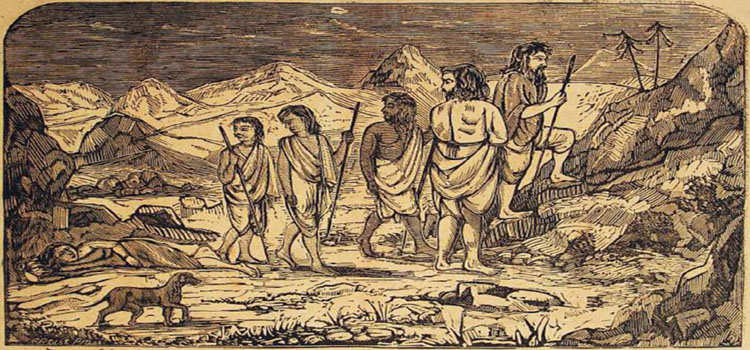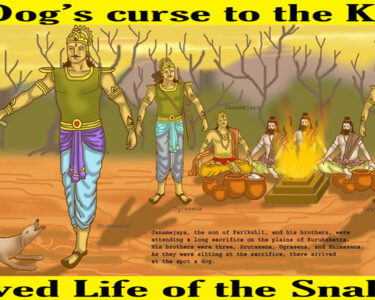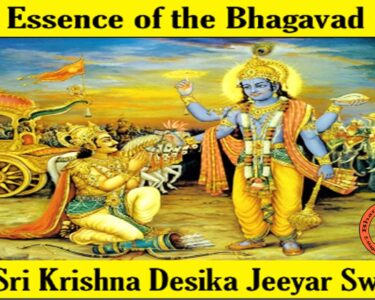“Soota continued, ‘The next is Mahaaprasthaanika, the seventeenth Parva. In this, those foremost among men – the Paandavaas – resigning their kingdom went with Draupadi on their great journey called Mahaaprasthaana. In this, they (Paandavaas with Draupadi) came across Agni, having arrived on the shore of the sea of red waters. In this, asked by Agni himself, Arjuna worshipped him duly, returned to him the excellent divine bow called Gandiva. In this, leaving his brothers who dropped one after another and Draupadi also, Yudhishthira went on his journey without (even) once looking back on them.
SRIMAD MAHABHARATA – AADI PARVA – SANGRAAHA (UPA) PARVA – PART 2(H) – MAHAAPRASTHAANIKA PARVA AND SWARGAROHANA PARVA: THE ABRIDGED VERSION
“This the seventeenth Parva is called Mahaaprasthaanika. The number of sections in this is three (3). The number of shlokas also composed by Vyaasa aware of truth is three hundred and twenty (320).
“You must know the Parva that comes after this is the extraordinary one called Swarga of divine incidents. Then seeing the divine chariot (Devaratha in Sanskrit) come to take him, Yudhishthira moved by kindness towards the dog that accompanied him, refused to ascend it (Devaratha) without his companion (the dog). Observing the illustrious Yudhishthira’s steady adherence to Dharma, Dharma (the God of Justice) abandoning his dog form showed himself to the king (Yudhishthira).
“Then Yudhishthira ascending to heaven felt much pain. The divine messenger showed him hell by an act of deception (Maayaa in Sanskrit). Then Yudhishthira, the soul of Dharma, heard the heart-rending lamentations of his (Yudhishthira’s) brothers remaining in that region under the discipline of Yama. Then Dharma and (Lord) Indra showed Yudhishthira the region appointed for sinners. Then Yudhishthira, after leaving the human body by a plunge in the divine Ganga, attained to that region which his acts merited, and began to live in joy respected by (Lord) Indra and all other Devas.
“This is the eighteenth Parva as narrated by the illustrious Vyaasa. The number of shlokas composed, O Rishis, by the Maharishi (Vyaasa) in this (parva) is two hundred and nine (209).
“The above are the contents of the Eighteen Parvas. In the appendix (Khita) are the Harivamsha and the Bhavishya. The number of shlokas contained in the Harivamsha is twelve thousand.’
“These are the contents of the section called Parva-Sangraha.
“Soota continued, ‘Eighteen Akshauhinis of troops came together for battle. The encounter that resulted was terrible and lasted for eighteen days. He who knows the four Vedas with all the Angas and Upanishads, but does not know this history (Mahabharata), cannot be regarded as wise. Vyaasa of immeasurable intelligence, has spoken of the Mahabharata as a treatise on Arthaa, on Dharma, and on Kaamaa. Those who have listened to his history (Mahabharata) can never bear to listen to others, as, indeed, they who have listened to the sweet voice of the male Kokila can never hear the dissonance of the crow’s cawing. As the formation of the three worlds proceeds from the five elements, so do the inspirations of all poets proceed from this excellent composition.
“O you Brahmana, as the four kinds of creatures (born from the parent body, born from the egg, born of hot moisture and vegetables) are dependent on space for their existence, so the Puranas depend upon this history (Mahabharata). As all the senses depend for their exercise upon the various modifications of the mind, so do all acts (ceremonials) and moral qualities depend upon this treatise (Mahabharata). There is not a story present in the world but does depend on this history (Mahabharata), as body (depends) upon the food it consumes. All poets cherish the (Maha)Bharata as servants desirous of promotion always attend upon masters of good lineage. As the blessed domestic Ashrama can never be surpassed by the three other Ashramas (modes of life) so no poets can surpass this poem.
“O Rishis, shake off all inaction. Let your hearts be fixed on Dharma, for Dharma is the one only friend of him that has gone to the other world. The most intelligent by cherishing wealth and wives can never make these their own, nor are these possessions lasting. The (Maha)Bharata uttered by the lips of Dwaipaayana (Vyaasa) is without a parallel; it is Dharma itself and sacred. It destroys sin and produces good. He that listens to it while it is being recited has no need of a bath in the sacred waters of Pushkara (present day Pushkar in the Ajmer district, Rajasthan state, India).
“A Brahmana, whatever sins he may commit during the day through his senses, is freed from them all by reading the (Maha)Bharata in the evening. Whatever sins he may commit also in the night by actions, words, or mind, he is freed from them all by reading (Maha)Bharata in the first twilight (morning twilight). He that gives a hundred cows with horns mounted with gold to a Brahmana well-versed in Vedas and all branches of learning, and he that daily listens to the sacred narrations of the (Maha)Bharata, acquires equal merit. As the wide ocean is easily passable by men having ships, so is this extensive history (Mahabharata) of great excellence and deep meaning with the help of this chapter called Parva Sangraha.”
“Thus ends the section called Parva-sangraha of the Aadi Parva of the blessed Mahabharata.”



